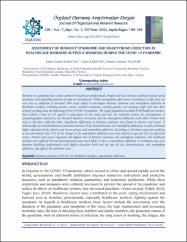| dc.contributor.author | Karataş, Kader Semra | |
| dc.contributor.author | Karataş, Yasin | |
| dc.contributor.author | Telatar, Tahsin Gökhan | |
| dc.date.accessioned | 2022-11-16T05:35:00Z | |
| dc.date.available | 2022-11-16T05:35:00Z | |
| dc.date.issued | 2022 | en_US |
| dc.identifier.citation | Karatas, K. S., Karatas, Y., & Telatar, T. G. (2022). Assessment Of Burnout Syndrome And Smartphone Addiction In Healthcare Workers Actively Working During The COVID-19 Pandemic. Journal Of Organizational Behavior Research, 7(1), 156-169. Https://Doi.Org/10.51847/3Uq2sEahxf | en_US |
| dc.identifier.issn | 2528-9705 | |
| dc.identifier.uri | Https://Doi.Org/10.51847/3Uq2sEahxf | |
| dc.identifier.uri | https://hdl.handle.net/11436/7039 | |
| dc.description.abstract | Burnout is a syndrome that is more common in healthcare professionals. People who have burnout syndrome tend to spend inordinate and unhealthy amounts of time on smartphones. While smartphones offer many conveniences in life, they can turn into an addiction if overused. This study aimed to investigate burnout syndrome and smartphone addiction in healthcare workers, including doctors, nurses, medical secretaries, security guards, and cleaning staff, who have been actively working since the beginning of the COVID-19 pandemic. The target population included 1190 healthcare workers, from which a total of 183 agreed to participate in the study and met the inclusion criteria for participation. A sociodemographic data form, the Maslach Burnout Inventory, and the Smartphone Addiction Scale-Short Version were used as the data collection tools. Significant differences in burnout syndrome were found in doctors and nurses. A relationship was observed between emotional burnout (EB), desensitization, and smartphone addiction, as well as between higher education levels, doctors and nurses groups, and smartphone addiction. According to the linear regression analysis, it was determined that 17% of the change in the smartphone addiction score was related to age and 16% to education status. Doctors and nurses experience the highest rate of burnout syndrome and smartphone addiction. The healthcare workers who suffered EB and desensitization were more likely to have a smartphone addiction. A correlation may exist between healthcare professionals with higher education levels and the rate of EB, desensitization, and smartphone addiction. Age affects the addiction score. | en_US |
| dc.language.iso | eng | en_US |
| dc.publisher | Gaziosmanpaşa Üniversitesi | en_US |
| dc.rights | info:eu-repo/semantics/openAccess | en_US |
| dc.subject | Burnout syndrome | en_US |
| dc.subject | COVID-19 | en_US |
| dc.subject | Healthcare workers | en_US |
| dc.subject | Smartphone addiction | en_US |
| dc.title | Assessment of burnout syndrome and smartphone addiction in healthcare workers actively working during the COVID-19 pandemic | en_US |
| dc.type | article | en_US |
| dc.contributor.department | RTEÜ, Tıp Fakültesi, Dahili Tıp Bilimleri Bölümü | en_US |
| dc.contributor.institutionauthor | Telatar, Tahsin Gökhan | |
| dc.identifier.doi | 10.51847/3Uq2sEahxf | en_US |
| dc.identifier.volume | 7 | en_US |
| dc.identifier.issue | 1 | en_US |
| dc.identifier.startpage | 156 | en_US |
| dc.identifier.endpage | 169 | en_US |
| dc.relation.journal | Journal Of Organizational Behavior Research | en_US |
| dc.relation.publicationcategory | Makale - Uluslararası Hakemli Dergi - Kurum Öğretim Elemanı | en_US |


















